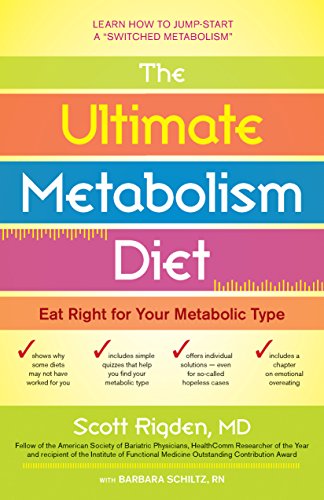Don't Blame Your Metabolism If You Can't Lose Weight Common Myths About Burning Calories
November 11, 2009
For those who struggle to lose weight, it has always made sense to blame a slow metabolism.
In my work as a diet doctor and nutritionist, I hear this excuse all the time to explain away everything from middle-age spread to the fact that their best friend eats twice as much, but stays effortlessly slim.
It’s not that they are overeating, they insist, it’s because their body doesn’t burn up calories as efficiently.
But what is the real truth about the link between your metabolic rate – that is, the amount of energy used up by your body just to keep your heart beating, your blood pumping and so on – and weight gain?
Does a slow metabolism automatically mean you will end up overweight? To find out, I have tackled seven of the most common myths about metabolism.
 The Ultimate Metabolis...
Best Price: $0.99
Buy New $5.00
(as of 11:30 UTC - Details)
The Ultimate Metabolis...
Best Price: $0.99
Buy New $5.00
(as of 11:30 UTC - Details)
Myth: Some people eat huge amounts and won’t get fat
This is so widely believed and yet so very far from the truth. If you have a lower than average metabolism, you might need fewer calories than some others for your body to carry out all the basic functions.
But we’re only talking about the calorie equivalent of a small latte or a small piece of cheese on a cracker per day.
It certainly doesn’t explain why your friend seems to get away with eating a side order of chips when you can’t.
Her metabolism is not that much higher than yours. The real reason she doesn’t put on weight and you do is simple. She almost certainly doesn’t eat as much food as that at every meal.
Most metabolism scientists agree these days that everyone who overeats will gain weight and so this super-skinny friend of yours will be cutting back on other meals and snacks to make up for the occasional indulgence.
I have conducted food trials where we have enlisted ‘naturally skinny’ volunteers to increase their calorie intake and they really struggled to overeat at every meal.
 Fire Up Your Metabolis...
Best Price: $1.12
Buy New $10.13
(as of 09:55 UTC - Details)
Fire Up Your Metabolis...
Best Price: $1.12
Buy New $10.13
(as of 09:55 UTC - Details)
Left to their own devices, their instincts were to skip a meal or go light on supper to balance out their intake.
Myth: Exercise helps boost metabolism
This isn’t exactly true either. It is certainly correct that resistance exercises such as free weights and gym machines build muscle, but muscle actually has quite a low metabolic rate and gaining a whole kilogram of muscle in the gym (which is a lot) would still add only ten calories – equivalent to half a teaspoon of sugar – to your metabolic rate, a day.
Myth: Menopause causes a drop in metabolic rate
We though we knew the answer to this about 20 years ago, but the researcher who drew this conclusion was subsequently prosecuted for fabricating his metabolism data and spent time in jail.
What we do know is that the final phase of the menstrual cycle in young women increases metabolic rate by about 5 per cent, making them super-hungry, and often with cravings for high-calorie treats.
So it’s quite likely the hormonal changes brought on by the menopause reverses this monthly rise. But it accounts for only a relatively small drop in terms of the calories the body needs to function – equivalent to a typical biscuit, in fact, per day.
Myth: Men have a faster metabolism than women which protects against weight gain
It is certainly true that men have a higher metabolism than women by about 300 calories a day. But while it used to be true that women gain more weight as they age, men have done a remarkable job catching up in recent years, so this higher metabolism doesn’t automatically protect men against weight gain.
Men need to keep an eye on calorie intake, too, if they want to stop piling on the pounds.
November 11, 2009

